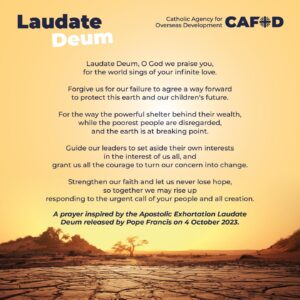In October 2023 Pope Francis published this Apostolic Exhortation in which he develops themes expressed in his 2015 encyclical, Laudato Si’ Its opening paragraphs communicate a sense of urgency: I have realised that our responses have not been adequate, while the world in which we live is collapsing and may be nearing the breaking point. (2) Climate Change is a global social issue and one intimately related to the dignity of human life. (2). The core message of this document is that;
Not enough is being done to address the climate crisis. All of us and especially those in power have a responsibility to act before it is too late.
This relatively short Church document is laid out in six chapters, the main points of which are given below.
Chapter One: The global climate crisis. Pope Francis outlines the global climate crisis. The text:
- Rejects the arguments of climate change deniers – the signs of climate change are here and increasingly evident. (5)
- Asserts that human activity as the major cause of climate change. (5)
- Links Climate change to the lifestyle of the rich and the developed world. (9)
- States that it will not be possible to halt the enormous damage we have caused. We barely have time to prevent even more tragic damage. (16)
- Reiterates the connection between humanity and the natural environment – Everything is connected and No one is saved alone. (19)
Chapter 2: The growing technocratic paradigm. The Pope returns to the theme of the technocratic paradigm, a phenomenon rejected in Laudato Si’ as an erroneous and distorted worldview that sees science, technology and financial growth as the means of solving all the world’s problems be they environmental or social.
- Pope Francis laments that this paradigm seems to be advancing and, in the pursuit of maximum gain at minimum cost, continues damaging the environment and the long-term wellbeing of people. (21)
- The document warns of the dangers that misuse of technology can bring. It is chilling to realize that the capacities expanded by technology have given those with the knowledge and especially the economic resources to use them, an impressive dominance over the whole of humanity and the entire world.…In whose hands does all this power lie …It is extremely risky for a small part of humanity to have it. (23)
- Contrary to this technocratic paradigm, we say that the world that surrounds us is not an object of exploitation, unbridled use and unlimited ambition. Nor can we claim that nature is a mere “setting” in which we develop our lives and our projects. (25)
- A healthy ecology is also the result of interaction between human beings and the environment….The technocratic paradigm has destroyed that healthy and harmonious relationship. (27)
- We need to rethink among other things the question of human power, its meaning and its limits….we have turned into highly dangerous beings, capable of threatening the lives of many beings and our own survival.(28)
- The mentality of maximum gain at minimal cost, disguised in terms of reasonableness, progress and illusory promises, makes impossible any sincere concern for our common home and any real preoccupation about assisting the poor and the needy discarded by our society. (31)
Chapter 3: The weakness of international politics. Pope Francis calls for renewed efforts to promote international and multilateral co-operation. This need not necessarily be through an existing international political authority or bodies, new initiatives are needed. He also emphasises the need for subsidiarity – civil society groups can achieve what international political authorities cannot achieve. Multilateral and international bodies must have real authority to achieve goals.
- For there to be solid and lasting advances…. preference should be given to multilateral agreements between States. (34)
- Many groups and organizations within civil society help to compensate for the shortcomings of the international community, its lack of coordination ….and its lack of attention to fundamental human rights. (37)
- A multilateralism “from below” and not simply one determined by the elites of power….can end up pressuring the sources of power. (38)
- A different framework for effective cooperation is required. It is not enough to think only of balances of power but also of the need to….consolidate respect for the most elementary human rights, social rights and the protection of our common home. (42)
All this presupposes the development of a new procedure for decision-making and legitimizing those decisions, since the one put in place several decades ago is not sufficient nor does it appear effective….It is no longer helpful for us to support institutions in order to preserve the rights of the more powerful without caring for those of all. (43)
Chapter 4: Climate Conferences: progress and failures. This short Chapter gives a candid overview of the history of the past Climate COPs pointing to the positive decisions made, the failures, difficulties and their often poor and disappointing results. After this it concludes by stating;
- …the accords have been poorly implemented, due to lack of suitable mechanisms for oversight, periodic review and penalties in cases of noncompliance….international negotiations cannot make significant progress due to positions taken by countries, which place their national interests above the global common good. (52)
Chapter 5: What to expect from COP28 in Dubai. If it is to provide hope, it must, unlike previous meetings be drastic, intense and count on the commitment of all (59). It will be a success if it leads to energy transition targets that are efficient, obligatory and monitored. If vested interests can be overcome COP 28 could be a decisive acceleration in transition – Alternatively, it might be a disappointment and jeopardize any good that has been done so far.
- Despite the many negotiations and agreements, global emissions continue to increase…. the necessary transition towards clean energy sources….is not progressing at the necessary speed. (55)
- We must move beyond the mentality of appearing to be concerned but not having the courage needed to produce substantial changes. (56)
- To suppose that all problems in the future will be able to be solved by new technical interventions is a form of homicidal pragmatism. (57)
- Let us finally admit that it [the climate crisis] is a human and social problem….it calls for involvement on the part of all…. to exercise a healthy pressure. (58)
- If there is sincere interest in making COP28 a historic event ….then one can only hope for binding forms of energy transition that meet three conditions: that they be efficient, obligatory and readily monitored. (59)
- May those taking part in the Conference be strategists capable of considering the common good and the future of their children, more than the short-term interests of certain countries or businesses. (60)
Chapter Six: Spiritual motivations: We are reminded that caring for our common home is integral to faith – authentic faith not only gives strength to the human heart, but also transforms life, transfigures our goals and sheds light on our relationship to others and with creation as a whole. (60) Individual action is important but the big changes must come from political decisions.
- ….responsibility for God’s earth means that human beings, endowed with intelligence, must respect the laws of nature and the delicate equilibria existing between the creatures of this world. (62)
- The universe shows forth the inexhaustible richness of God.… it is not a matter of indifference to us that so many species are disappearing and that the climate crisis endangers the life of many other beings.(63)
- Let us stop thinking, then, of human beings as autonomous, omnipotent and limitless, and begin to think of ourselves differently, in a humbler but more fruitful way. (68)

- I ask everyone to accompany this pilgrimage of reconciliation with the world that is our home and to help make it more beautiful, …At the same time, I cannot deny that …the most effective solutions will not come from individual efforts alone, but above all from major political decisions on the national and international level. (69)
- Yet what is important is … to realize that there are no lasting changes without cultural changes, without a maturing of lifestyles and convictions within societies, and there are no cultural changes without personal changes. (70)
- Efforts by households to reduce pollution and waste, and to consume with prudence, are creating a new culture. ….are helping to bring about large processes of transformation rising from deep within society. (71)
- …a broad change in the irresponsible lifestyle connected with the Western model would have a significant long-term impact. As a result, along with indispensable political decisions, we would be making progress along the way to genuine care for one another. (72)
- “Praise God” is the title of this letter. For when human beings claim to take God’s place, they become their own worst enemies. (73) Human beings through praising themselves, i.e. though greed and self interest have caused the climate crisis. By Praising God, i.e. putting Him first we can restore a right relationship with Him, our neighbour and creation – everything is connected.

